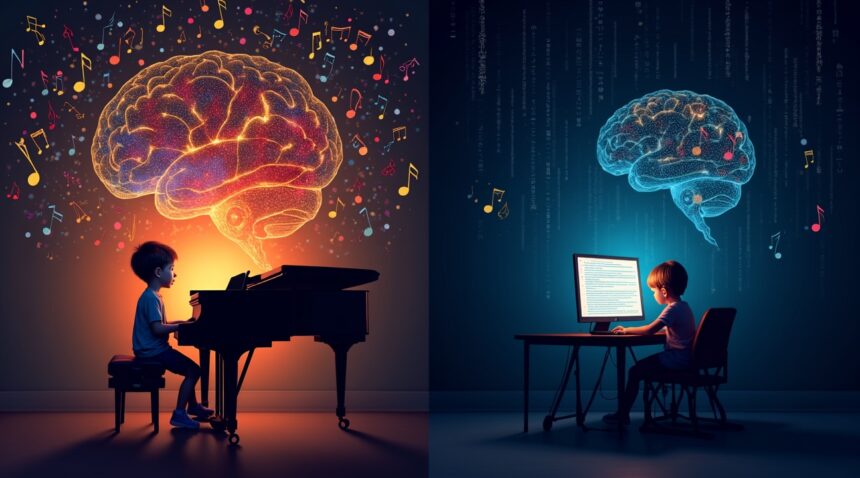MIT researchers have uncovered compelling evidence that musical training produces more comprehensive brain development in children than coding education.
Neuroimaging studies show that music education enhances brain connectivity across areas related to memory, language, and executive function. While coding supports logical thinking, learning music simultaneously engages sensory, motor, and cognitive systems, resulting in more profound and lasting neural changes. Consequently, children involved in music tend to excel academically across various subjects.
Key Takeaways
- Musical training strengthens brain connectivity between hemispheres and enhances the corpus callosum, supporting better integration of logical and creative thinking processes.
- Children learning instruments perform better in reading, mathematics, and language skills than those without music education, even after they stop formal training.
- Music education builds crucial life skills such as patience, persistence, emotional intelligence, and teamwork—traits that coding classes typically do not foster.
- Early music instruction leads to lasting brain changes, especially when started in early childhood, with greater long-term cognitive advantages.
- Unlike coding, which may become outdated due to rapidly evolving technologies, musical skill remains a uniquely human and lifelong asset.
To explore the growing body of research supporting these findings, you can visit the MIT News website for detailed articles and insights.
Music Rewires Young Brains in Ways Coding Cannot Match
MIT researchers have uncovered compelling evidence that musical training creates profound changes in developing brains that coding education simply cannot replicate. Publishing their findings in the Journal of Neuroscience, these scientists discovered that children who learn musical instruments develop significantly stronger structural and functional brain networks compared to their non-musical peers.
Enhanced Brain Connectivity Through Musical Learning
The research reveals that musical training specifically strengthens areas tied to speech, sound processing, memory, and executive function. Children who had learned instruments demonstrated markedly higher levels of both structural and functional connectivity throughout their brains. This enhanced connectivity particularly benefits auditory processing capabilities, giving young musicians advantages in language development and cognitive processing that extend far beyond musical ability.
Musical education also strengthens the corpus callosum, which serves as the critical bridge connecting the brain’s two hemispheres. This enhanced connection facilitates better integration between logical and creative thinking processes. While artificial intelligence continues advancing in education, the human brain’s natural development through music remains unmatched.
Timing Matters for Maximum Benefits
Early exposure to musical training proves crucial for maximizing these neurological advantages. The MIT researchers found that children who begin musical education at younger ages experience more substantial and lasting benefits to their brain development. These improvements persist even if children later discontinue their musical studies, suggesting that early musical training creates permanent positive changes in neural architecture.
The research demonstrates that musical training fundamentally reshapes both brain structure and function in ways that boost overall neurological capabilities. Executive function improvements help children with planning, decision-making, and problem-solving across all areas of learning. Enhanced auditory processing benefits language acquisition and communication skills throughout life.
These findings suggest that while coding education certainly has value, musical training offers unique developmental advantages that cannot be replicated through other forms of learning. The comprehensive nature of musical education engages multiple brain systems simultaneously, creating a rich network of neural connections that supports cognitive development in ways that more specialized technical training cannot match. Just as video games can positively impact development, music education provides its own distinct cognitive benefits that extend well beyond the practice room.
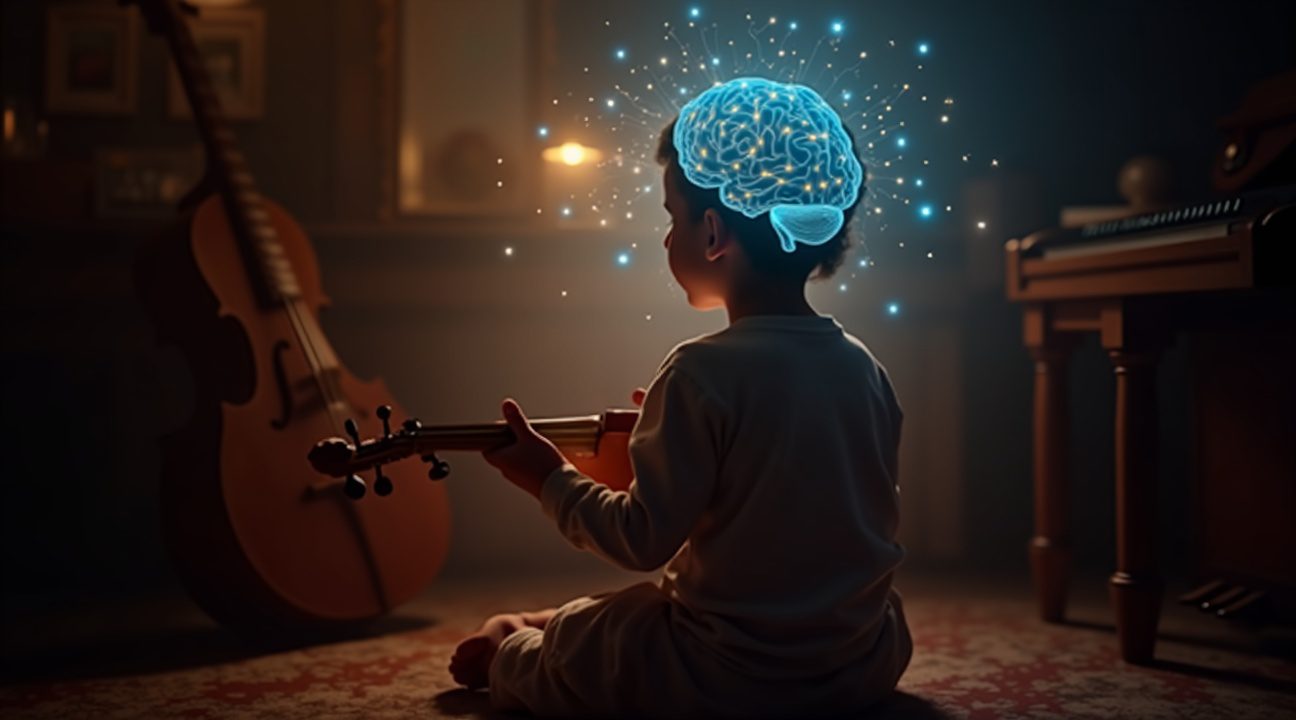
Why Music Engages More of Your Child’s Mind Than Programming
Music training creates a neural symphony in developing minds that coding simply can’t match. When children learn to play an instrument, they activate multiple brain regions simultaneously, creating connections that extend far beyond the practice room. This multisensory engagement distinguishes music education from programming instruction in fundamental ways.
The Full-Brain Workout of Musical Training
Playing an instrument demands simultaneous coordination of listening, physical movement, complex reading, and real-time adaptation. Children must decode musical notation while their fingers execute precise movements, all while their ears monitor the sounds they produce and make instant adjustments. This process engages sensory, motor, and cognitive systems in ways that unlock brain potential through integrated learning experiences.
Musical training also incorporates emotional expression as a core component. Children learn to interpret and convey feelings through their performance, developing emotional regulation skills that transfer to other areas of life. This emotional integration activates brain regions responsible for processing feelings and social connections, creating neural pathways that support both academic learning and interpersonal relationships.
Programming, while valuable, primarily engages abstract reasoning and logical problem-solving centers of the brain. Children learn to think in linear sequences and develop systematic approaches to breaking down complex problems. However, this cognitive engagement remains largely confined to specific brain regions focused on analytical thinking.
Lasting Cognitive Benefits That Transfer Across Subjects
Music lessons strengthen working memory—the mental workspace children use to hold and manipulate information. When young musicians read notes, remember fingering patterns, and maintain rhythm simultaneously, they’re building the same cognitive capacity they’ll use for math calculations, reading comprehension, and following multi-step instructions.
Attention control represents another significant advantage of musical training. Learning to focus on multiple musical elements while filtering out distractions develops sustained attention skills that benefit academic performance across all subjects. Children who receive music instruction show improved ability to concentrate during challenging tasks and resist distracting stimuli.
The neural changes from music training persist long after practice sessions end, demonstrating durable educational value that paves the way for future learning success. Brain imaging studies reveal that musicians maintain enhanced neural connectivity years after beginning their training, suggesting that early musical education creates lasting cognitive advantages.
Musical training creates cross-domain benefits that extend beyond the practice room. Children who learn instruments often show:
- Improved mathematical reasoning
- Enhanced language skills
- Better social cooperation
These transferable skills emerge from the complex cognitive demands that music places on developing minds.
Programming education, while building valuable technological literacy, doesn’t generate the same breadth of cognitive enhancement. The linear, logical nature of coding develops specific problem-solving abilities but lacks the multisensory integration that makes musical training so cognitively rich. Children who learn programming gain important technical skills, but they miss the comprehensive brain development that comes from musical instruction.
The research reveals that music education provides cognitive benefits that extend well beyond artistic expression. When children engage with musical instruments, they’re not just learning to play—they’re developing enhanced working memory, stronger attention control, better emotional regulation, and improved multisensory integration. These skills create a foundation for academic success and life-long learning that shapes individuals in profound ways.
Parents and educators who prioritize music education are investing in comprehensive cognitive development that benefits children across multiple domains. The complex, integrated nature of musical learning creates neural connections and cognitive abilities that support success in:
- Mathematics
- Reading
- Social interactions
- Creative problem-solving
These advantages persist throughout a child’s educational journey.
Music Students Outperform Peers in Reading, Math, and Language Skills
Research from MIT demonstrates that students who receive music education consistently achieve higher academic performance across multiple subjects compared to their peers who don’t participate in musical training. The cognitive benefits extend far beyond simply learning to play an instrument or sing, creating lasting improvements in fundamental learning abilities.
Enhanced Language and Reading Development
Piano lessons produce remarkable improvements in children’s ability to process language, according to MIT studies. Kindergartners who received piano instruction showed significantly better performance in distinguishing spoken words, particularly consonants, which directly enhanced their word recognition abilities. This improvement in auditory processing creates a strong foundation for reading comprehension that continues throughout their educational journey.
The language development benefits from music instruction prove to be at least as powerful as traditional reading programs. Children who participate in music lessons develop stronger verbal memory skills, allowing them to retain and process information more effectively. This enhanced verbal processing capability translates into better performance across all subjects that require language comprehension.
Social-Emotional Skills That Coding Can’t Match
Music education through bands and choirs cultivates essential social-emotional learning skills that coding programs simply can’t replicate. Students learn empathy through musical expression and collaboration through ensemble performance. These experiences require real-time communication and emotional connection with peers, fostering interpersonal skills that prove invaluable throughout life.
Mathematical thinking also receives a significant boost from music education. Students develop:
- Pattern recognition
- Spatial reasoning
- Abstract thinking
These cognitive skills directly transfer to mathematical problem-solving and logical reasoning abilities.
The collaborative nature of musical performance teaches children to work together toward a common goal while maintaining individual excellence. Unlike coding, which often involves solitary work, music requires constant awareness of others and the ability to adjust one’s performance in response to the group. This builds communication skills and emotional intelligence that benefit students in all areas of life.
Research consistently shows that music students demonstrate stronger academic performance across reading, mathematics, and language skills compared to their non-musical peers. The cognitive benefits extend beyond academic subjects, creating well-rounded individuals with enhanced emotional and social capabilities. While coding certainly has value, the comprehensive developmental benefits of music education make it a superior choice for building intelligence in young learners. Music instruction creates neural pathways that support learning across all disciplines while simultaneously developing the interpersonal skills essential for success in our increasingly collaborative world.
From Preschool to Teen Years: Music’s Lifelong Developmental Benefits
Music education delivers remarkable developmental advantages that span from early childhood through adolescence, creating a foundation for lifelong learning and growth. Children who engage with music consistently throughout their formative years demonstrate accelerated progress across multiple developmental domains, challenging traditional assumptions about academic priorities.
Early Foundation Building Through Musical Engagement
During the preschool years, music education acts as a powerful catalyst for language development. Young children exposed to musical instruction show enhanced vocabulary acquisition, improved phonological awareness, and stronger verbal communication skills. The rhythmic patterns inherent in music help developing brains organize linguistic information more effectively, creating neural pathways that support reading readiness and comprehension.
Elementary school students who participate in music programs demonstrate significantly improved problem-solving abilities compared to their peers. The cognitive demands of learning musical notation, understanding rhythm, and coordinating physical movements create a unique training ground for analytical thinking. These skills transfer directly to mathematical concepts, spatial reasoning, and logical processing tasks that form the backbone of academic success.
Adolescence brings its own set of challenges, but music education provides crucial support during this critical period. Teenagers involved in musical activities show increased confidence levels and stronger self-esteem. The collaborative nature of ensemble playing teaches valuable social skills while individual practice builds personal achievement recognition. Performance opportunities allow young people to experience success in a structured environment, fostering resilience and emotional regulation.
Building Essential Life Skills Through Musical Practice
Regular music practice cultivates three fundamental qualities that extend far beyond the practice room. These attributes form the cornerstone of personal and professional success:
- Patience develops naturally through the repetitive process of mastering musical pieces, teaching children that meaningful achievements require sustained effort over time
- Persistence emerges as students work through challenging passages, learning to view obstacles as temporary setbacks rather than permanent barriers
- Focused attention strengthens through concentrated practice sessions, improving concentration skills that benefit all academic subjects
The discipline required for consistent musical practice creates habits that serve students throughout their educational journey. Unlike many academic subjects that rely heavily on passive absorption of information, music demands active engagement and continuous refinement. This active learning approach mirrors the problem-solving skills emphasized in modern educational approaches and prepares students for complex thinking tasks.
The cumulative effect of these developmental benefits raises important questions about current education policy trends. Many school districts have reduced or eliminated music programs to allocate more resources to STEM subjects, despite growing evidence of music’s cognitive and emotional advantages. This shift overlooks the interconnected nature of learning and the unique contributions that musical education makes to overall intellectual development.
Research consistently demonstrates that music education doesn’t compete with academic achievement—it enhances it. Students with strong musical backgrounds often excel in traditionally separate subjects like mathematics and science. The pattern recognition, sequential processing, and analytical skills developed through music study create cognitive flexibility that benefits all areas of learning.
The emotional benefits of music education prove equally valuable. Regular musical engagement helps children develop emotional intelligence, stress management skills, and creative expression abilities. These competencies become increasingly important as students face academic pressures and social challenges throughout their school years.
Educational policymakers might reconsider the wisdom of cutting music programs when evidence points to such comprehensive developmental benefits. The skills fostered through musical education—critical thinking, collaboration, perseverance, and creative problem-solving—align perfectly with the competencies needed for success in an increasingly complex world. Music education offers a proven pathway for developing well-rounded individuals who possess both intellectual capability and emotional resilience.
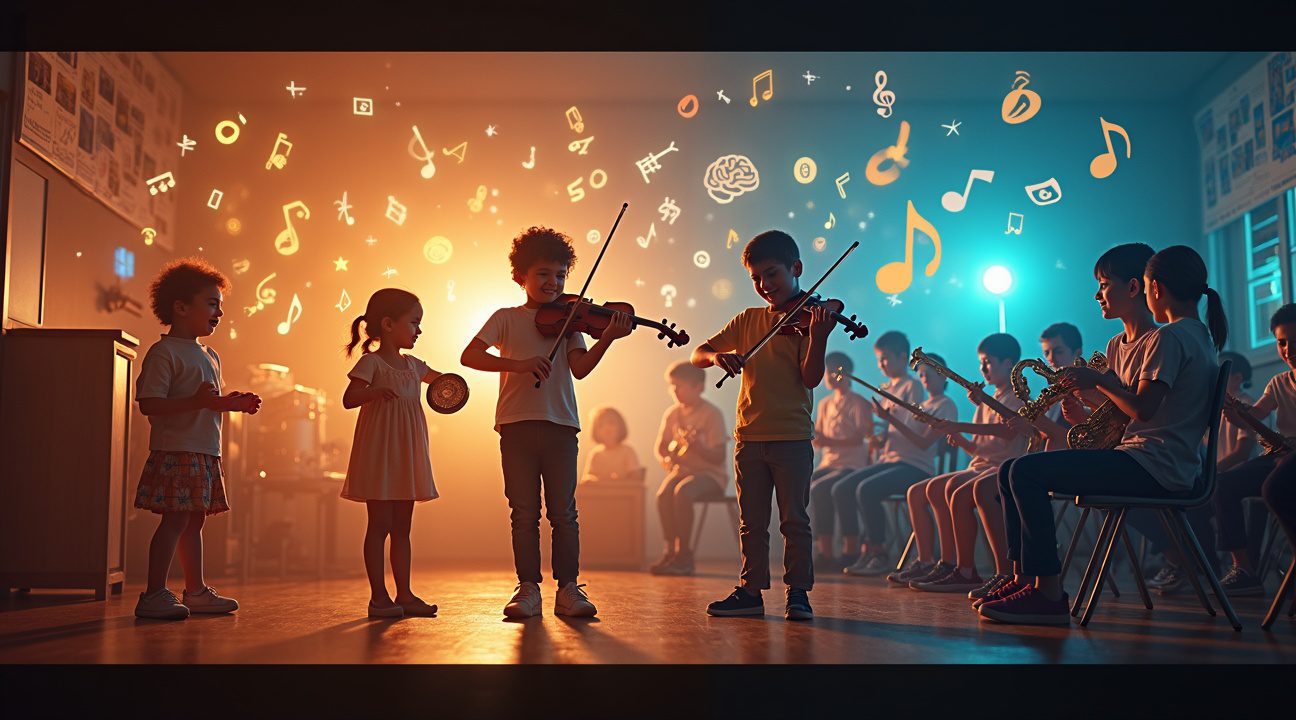
Coding Skills Have Limits That Music Education Doesn’t
While coding undoubtedly develops logical and abstract thinking abilities, I find its long-term educational value faces significant constraints that music education simply doesn’t encounter. Programming languages and coding frameworks evolve rapidly, often becoming obsolete within just a few years. What students learn today in Python or JavaScript may hold limited relevance by the time they enter the workforce.
The Automation Challenge for Coding Skills
Advanced artificial intelligence systems and low-code platforms are increasingly automating many programming tasks that once required human expertise. These technological advances suggest that specific coding skills may become less valuable over time, similar to how calculators reduced the emphasis on manual arithmetic. I observe that artificial intelligence paving the way represents a fundamental shift in how we approach problem-solving, potentially making traditional programming knowledge less essential.
Music’s Irreplaceable Human Elements
Music education cultivates fundamentally human attributes that resist automation entirely. Creativity, emotional intelligence, and empathy develop through musical practice in ways that coding instruction simply cannot replicate. These skills become increasingly valuable as technology handles more routine cognitive tasks.
Consider these uniquely human capabilities that music education strengthens:
- Emotional expression and interpretation through sound and rhythm
- Collaborative listening and real-time adaptation with other musicians
- Cultural communication that transcends language barriers
- Aesthetic judgment and creative decision-making
- Physical coordination between mind, body, and instrument
I recognize that coding teaches valuable problem-solving approaches, but these logical thinking patterns can be developed through many disciplines. Music offers something different—it engages both analytical and creative brain regions simultaneously, fostering connections that pure logic-based learning cannot achieve.
The longevity of musical skills presents another crucial advantage. A child who learns piano fundamentals will carry those abilities throughout life, regardless of technological changes. Meanwhile, programming languages that seem essential today may become historical curiosities within a decade.
A balanced educational approach acknowledges both technological literacy and artistic development. However, I believe prioritizing music education provides more enduring cognitive benefits. Musical training develops pattern recognition, memory, and coordination while simultaneously nurturing creativity and emotional intelligence—capabilities that remain uniquely human regardless of how sophisticated technology becomes in shaping individuals.
Rather than viewing this as an either-or choice, educators should recognize that music education offers foundational cognitive development that enhances all other learning, including eventual coding instruction. The reverse relationship doesn’t hold true with the same strength.
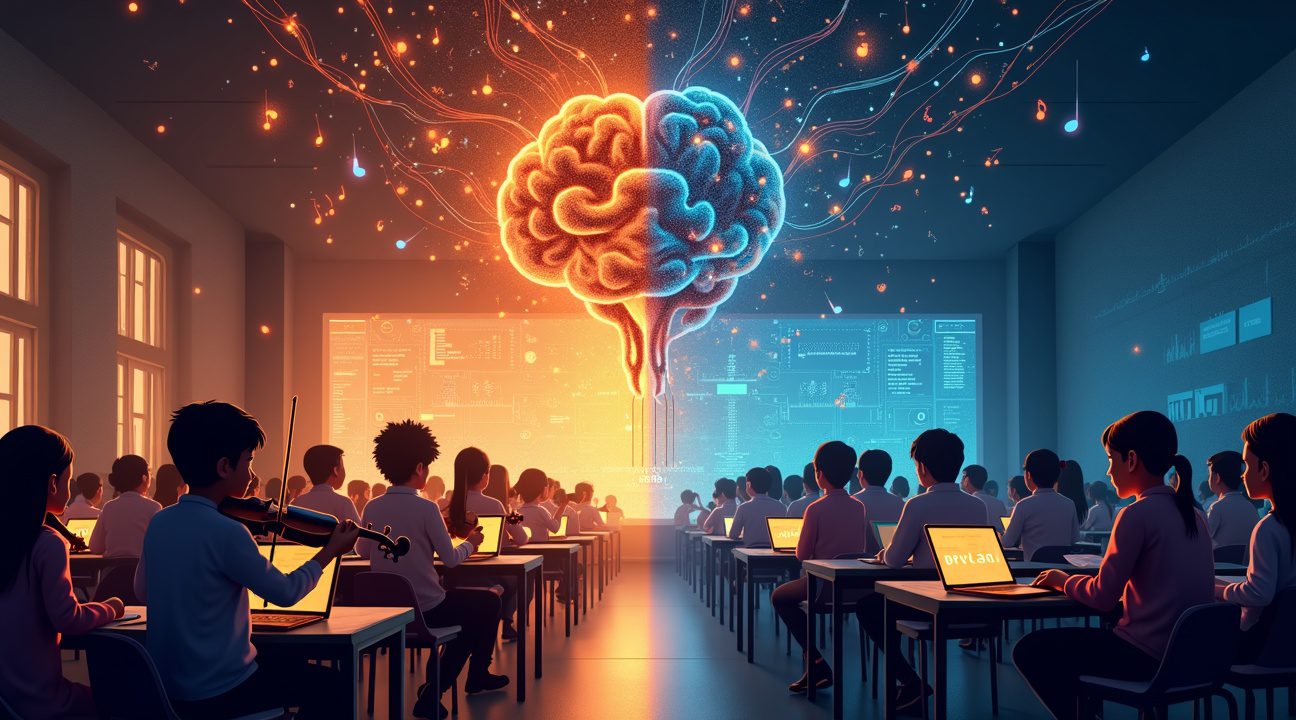
What This Means for Parents and Schools Right Now
Parents and educators can’t ignore the compelling neurological evidence that music instruction creates broader cognitive improvements than coding education. Brain imaging studies reveal that musical training activates multiple regions simultaneously, creating neural pathways that enhance memory, attention, and problem-solving abilities across all academic subjects. This is significant because it challenges the current educational trend of prioritizing STEM skills at the expense of arts programs.
Beyond Academic Performance: Building Essential Life Skills
Music education develops critical abilities that extend far beyond the classroom. Students participating in musical ensembles learn sophisticated team coordination skills, mastering the art of listening while performing and responding to subtle cues from conductors and fellow musicians. This collaborative experience builds communication skills that prove invaluable in any career path, much like how video games shape individuals through interactive experiences.
Daily practice routines establish discipline and time management habits that transfer directly to academic work and professional life. Students who maintain consistent practice schedules often develop superior organizational skills compared to their peers. Live performances build confidence and stage presence, teaching young people to manage anxiety and present themselves effectively under pressure.
The emotional intelligence gained through musical expression can’t be replicated through coding instruction alone. Music requires students to interpret feelings, convey emotions through performance, and connect with audiences on a deeper level. These skills become increasingly valuable as artificial intelligence shapes the future workplace, where human creativity and emotional connection will differentiate workers from automated systems.
Schools cutting music programs to fund more technology courses may be undermining their students’ overall cognitive development. Research suggests that music training creates a foundation for learning that enhances performance in mathematics, science, and language arts more effectively than direct instruction in those subjects alone. This doesn’t mean coding lacks value, but rather that music education provides broader benefits that support all learning.
Educational administrators should reconsider policies that treat arts education as expendable. Budget decisions often reflect the misconception that practical skills like programming offer more career value than creative disciplines. However, the neurological evidence demonstrates that musical training develops the cognitive flexibility and creative problem-solving abilities that drive innovation in technology fields.
Parents can advocate for balanced curricula that include robust music programs alongside STEM education. Private music lessons remain an option for families whose schools have reduced arts offerings, though group instruction provides additional social benefits that individual study can’t match. The key lies in understanding that musical education isn’t an extracurricular luxury but a fundamental component of comprehensive cognitive development.
These findings also highlight the importance of early intervention. Brain plasticity remains highest during childhood and adolescence, making elementary and middle school years particularly crucial for musical instruction. Schools that introduce coding while eliminating music programs may be missing opportunities to maximize their students’ intellectual potential.
The research challenges educators to think more systematically about how different subjects contribute to overall intelligence. Rather than viewing music and technology as competing priorities, effective schools should recognize how musical training enhances students’ capacity to excel in technical subjects. This approach requires administrators to resist the pressure to chase educational trends and instead focus on evidence-based practices that support long-term student success.
Music education’s impact on social development shouldn’t be underestimated either. Band, orchestra, and choir programs create communities where students from diverse backgrounds collaborate toward shared goals. These experiences build empathy and cultural understanding that tackle real-world problems requiring human insight and cooperation.
The implications extend to teacher training and professional development as well. Music educators need support and resources to maximize their programs’ cognitive benefits, while administrators require education about the neurological research supporting arts instruction. Only through comprehensive understanding of music’s role in intellectual development can schools make informed decisions about curriculum priorities that truly serve their students’ best interests.
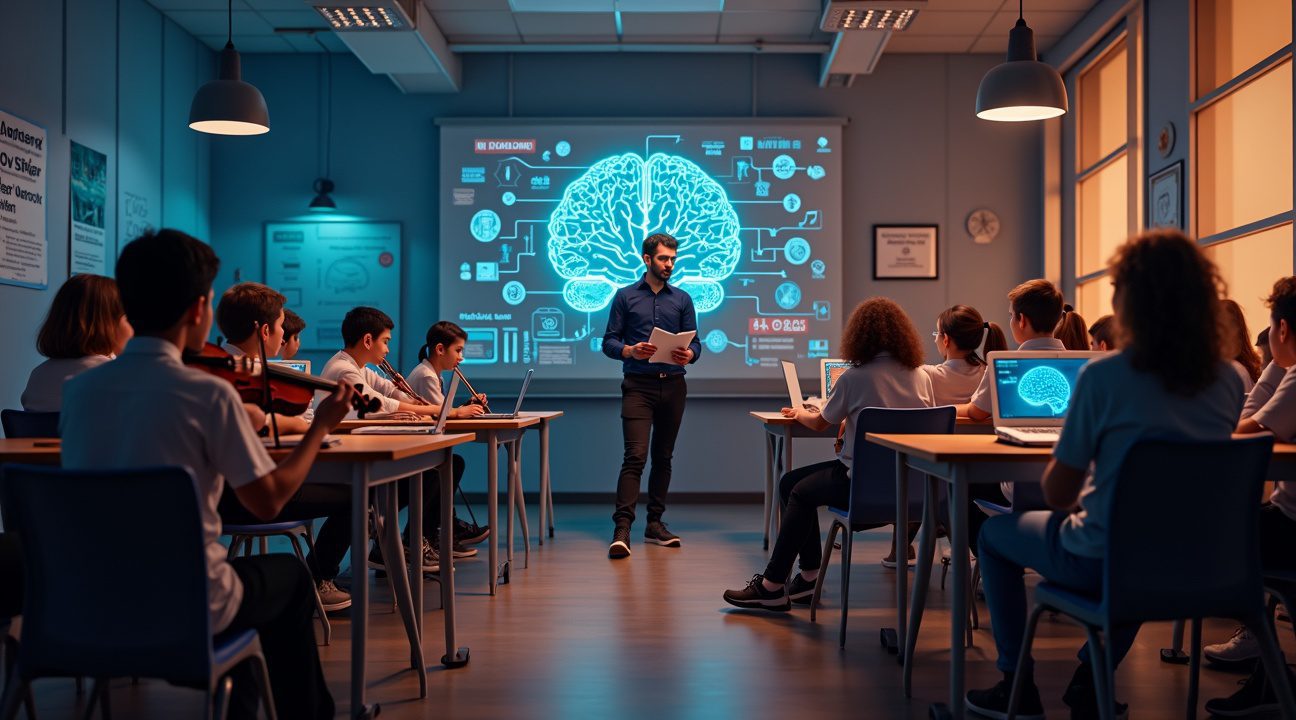
Sources:
Bonnes Notes – Music Rewires Young Brains in Ways Coding Cannot Match
Awareness Act – Why Music Engages More of Your Child’s Mind Than Programming
Prince Ea Media – Music Students Outperform Peers in Reading, Math, and Language Skills
Raising Nerd – From Preschool to Teen Years: Music’s Lifelong Developmental Benefits
MIT News – Music Students Outperform Peers in Reading, Math, and Language Skills

